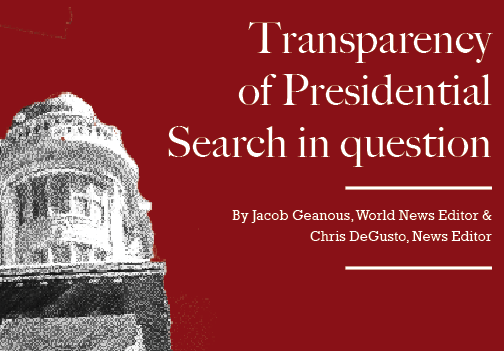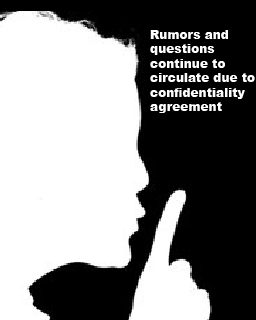Your donation will support the student journalists of Suffolk University. Your contribution will allow us to cover our annual website hosting costs.
Transparency of Presidential Search in question
Suffolk community seeks full story from PSC
April 11, 2018
The Suffolk University presidential election had all the components of a blockbuster political drama: a massive pool of applicants, a divided room of voters sworn to secrecy, a company involved in the electoral process with a unknown stake in the race and an upset victory finale. The only thing it lacked was the transparency to truly translate the long awaited decision to the campus audience.
In the end, Marisa Kelly was elected president to growing campus support. Kelly is not a part of the continuing controversy surrounding the election, however, the selection process is.
After an investigation that took place over the span of weeks by The Suffolk Journal, it was found that Kelly, previously the university provost, was not the Suffolk Presidential Search Committee (PSC) front-runner heading into the final vote, according to sources.
Kelly, who has been the University’s acting president for more than a year-and-a-half, was ranked as the third choice by the 19 member PSC as they convened for the final time in late February. But oddly, the PSC could not coalesce around either of the final two candidates. In fact, one of the two was removed from the concluding ballot at the last minute. Many of the committee members abstained from voting, according to a source.
Ultimately, the University’s Board of Trustees was tasked with the final say in the matter of selecting Suffolk’s next President; the PSC’s choice was only a recommendation, and it was conflicted. But what transpired during that final meeting has become a point of contention on campus.
An anonymous five-page document that has been circulating throughout the campus through chains of emails following the election announcement alleged “egregious violations” of the PSC’s process.
Search Committee Chair John Brooks responded in a statement to Journal last week.
“The process the Presidential Search Committee and the Board used to select Marisa Kelly as president was conducted with the highest level of integrity, was entirely appropriate, and produced a great result,” said Brooks. “Despite an anonymous memo that mischaracterizes the search process, we will continue to honor the confidentiality of that process to ensure its integrity.”
While some of the rhetoric in the letter has been proved to be inflammatory falsities, a portion of the allegations have been confirmed through confidential sources.
All PSC members elected to sign a non-disclosure agreement before the search began in order to take place in the process. This effectively put the Suffolk community in the dark throughout the approximately 18 months leading up to the appointment of Kelly, with brief updates on the search process delivered months apart. This non-disclosure agreement extended to those who became privy to the inner workings of the search process.
Associate Communications and Journalism Professor Bruce Wickelgren said while he is pleased Kelly will be remaining in the top office in order to maintain stability at the university, he characterized the process as being “very poor” in a recent interview with The Suffolk Journal.
“The fact that there are even rumors present that other candidates were considered before her and a coup seemed to appear, this doesn’t speak well to the process,” said Wickelgren. “And a lack of openness– it’s something that I’m not crazy about. To me it’s reinforcing all the [upheaval] that we had in the last five years, actually further back all the way back to [former University President David] Sargent.”
Search firm AGB Search was hired by the university to “guarantee a smooth, effective search” according to the company’s official website. One unnamed source estimated the cost to hire the firm at $150,000. AGB Search recommended that the PSC wittle the presidential candidates down to a field of four individuals, which Kelly was included in, then down to a field of two, which Kelly was not included in.
During the final days of the election, sources say it was found that background information on one of the two final candidates raised red flags with the PSC. It also came to light that this candidate was a client of AGB, which also assists in placing professionals in open positions. This resulted in the aforementioned individual’s removal from the candidate pool shortly before the final vote in late February.
In the days before the final vote, Trustee Chairman and PSC member Robert Lamb allegedly called individual members of the PSC to discuss whether Kelly should be brought back into the final vote, according to an unnamed PSC member. Originally, the vote was supposed to be administered through paper ballots, but it was changed to an electronic ballot on the day of the final vote, which lasted for approximately three hours, according to an unnamed source who held a seat on the PSC.
When the votes were counted, it was determined that the majority of PSC members cast abstention ballots, meaning that they did not choose any candidate presented on the final ballot. The Board of Trustees ultimately decided on Kelly as the new president.
Last week a Faculty Senate meeting addressed these rumors and passed a four-part motion, the latter of which requested that the confidentiality agreement be revisited.
“We also request that all members of the Presidential Search Committee be released from any confidentiality restrictions that they may have about the process, as the Presidential Search is now complete,” read an email containing the passed motion from Faculty Senate co-chair Colette Dumas to The Journal.
The motion passed 11-0 according to Dumas; the first two sections addressed the rumors and acknowledged that due to the confidentiality of the search process, “no independent means exists to verify or disprove these allegations.” The third section requested that Brooks advise the Faculty Senate of what to tell colleagues in response to inquiries.
This week, Brooks released a statement to the Faculty Senate regarding their motion.
“I would not let speculative rumors undermine our collective vision of an exciting future for Suffolk. As you know, the committee had been very committed to sharing information with the community beginning back when we initiated the search effort in the Fall of 2016,” Brooks wrote.
“It remains in the best interest of Suffolk University to continue to honor the strict confidentiality of the search process,” Brooks continued later in the correspondance.
Faculty Senate member and economics professor Dr. Jonathan Haughton told Suffolk Journal reporters recently that searches of this nature typically impose a confidentiality agreement for the beginning of the search, but have final candidates for the position come to the university to meet stakeholders.
“That’s indeed the way we’ve done it in the previous presidential searches,” said Haughton. “This time however it was a bit different, partly at the insistence of the firm that was helping the search committee. [AGB] said that it should be a closed search which would mean that it would be confidential from start to finish.”
Haughton highlighted the benefits of a completely closed process, one of them being a larger number of applicants, but also said that it may have put the university in a precarious place.
“I do know that many faculty, and a number of administrators, strongly argued before this recent process started that the process shouldn’t be closed at that final stage,” said Haughton. “And certainly we’d be in a better place today had that been the case, in my opinion.”


Andy Cataluna • Apr 13, 2018 at 10:25 am
So a committee that signed an NDA…
And told everyone they signed an NDA…
Abided by the NDA?
Not to drag your work (you’ve clearly done a lot of research of which I’m proud as a former Journal staffer,) and I’m semi-playing devil’s advocate, but I’m not seeing the story here.
If the Faculty Senate isn’t comfortable with the NDA didn’t they have a LOT of lead time to raise that concern at the outset? And wouldn’t doing so then have saved everyone a lot of time and controversy? I think the concern is fair, for the record, but it sounds like the FS, if anyone, acted imprudently in this case…
James Finkelstein • Apr 11, 2018 at 7:18 pm
Along with my colleague, Judith Wilde, in 2016 we conducted the first-ever and only study of the contracts between universities and executive search firms in the hiring of presidents, chancellors and provosts. While we only had access to contracts from public university searches, we believe that much of what we’ve learned applies to private universities as well.
This story about the search for the new president of Suffolk University is consistent with our sense of the rapidly increasing trend of what we’ve called secret searches—a trend that conincides with the virtual takeover of presidential searches by executive search firms over the last two decades. Today, nearly 95% of all presidential searches are conducted with the assistance of these for-profit firms.
These consultants tell their clients that confidentiality is essential in order to recruit the best candidates. Some go as far as providing anecdotal information about individuals who lost their job when it became known that they were applying for other positions. Yet, their is no empirical evidence whatsoever to support such a claim. But, as these reporters point out, not only are search committee members now being required to sign confidentially agreements, we’ve documented many instances where these agreements last in perpetuity. We’ve seen some that threaten faculty members with breaking tenure or criminal prosecution.
We know of no research that supports the claim that secret searches result in a larger, more diverse and highly qualified pool of candidates. Nor is there any research that supports the claim that presidents who are appointed through such a process are more successful or stay longer. And, for any anecdote provided by a search firm supporting secret searches we can match that with one that negates the claim. Further, there is an argument to be made that the major beneficiaries of secrecy are the candidates and the search firms.
Finally, since we know that the so-called “faculty grapevine” is the most through way to vett a candidate for any position, we have to ask why a governing board would not want to take advantage of such a resource. In not doing so, governing boards seem to be putting the privacy interests of the candidates ahead of those of the institution.
We should disclose that we know AGB Search. Several of their contracts were in our study and we’ve spoken with several of their key staff. The implication in this article that they may knowingly did not disclose a real, perceived and/or potential conflict of interest is not consistent with our experience. Further, failure to do so simply wouldn’t make good business sense. We’d suggest that more reporting is necessary, including providing AGB with an opportunity to respond.
James H. Finkelstein
Professor Emeritus of Public Policy
Schar School of Policy and Government
George Mason University
[email protected]